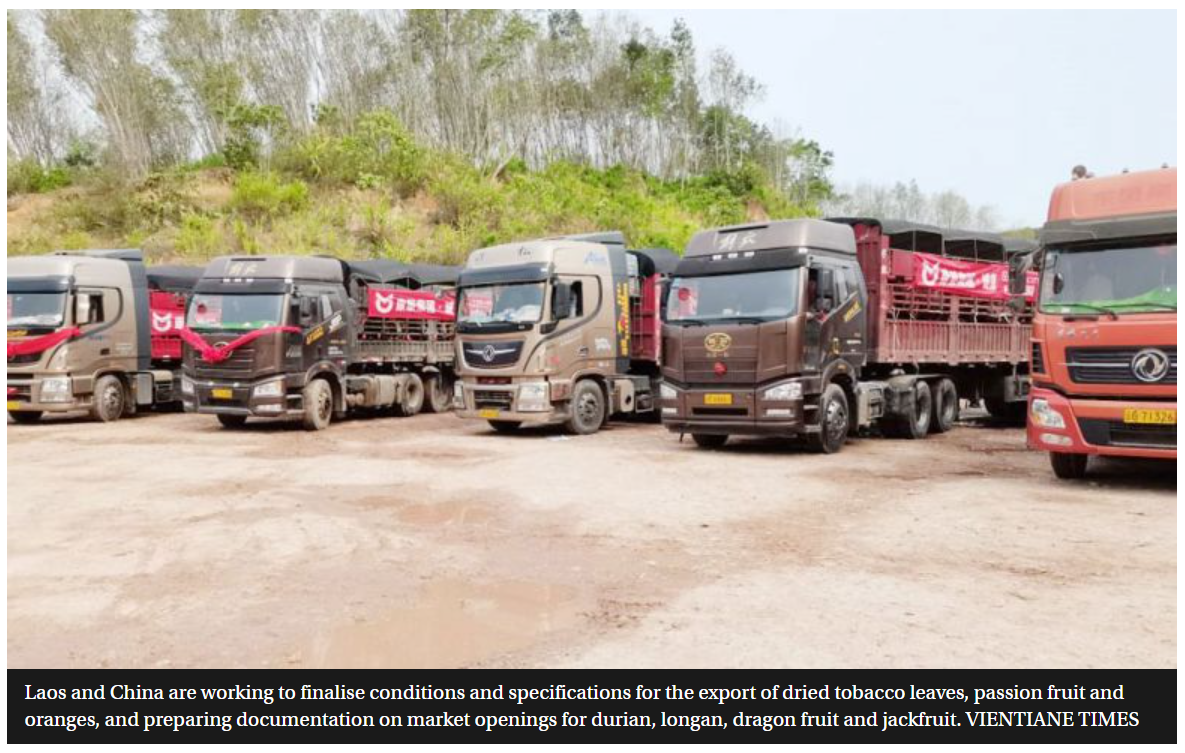Laos to talk more agri exports with China
The Lao government will hold negotiations with China to seek market openings for the export of more than 90 agricultural products by 2025.
Minister of Agriculture and Forestry Dr Phet Phomphiphak spoke about the government’s goals for exports at a recent event in Vientiane for the signing of a cooperation agreement by AIDC Trading Sole Co Ltd and Zhengzhou City Grain and Oil Industry Co Ltd.
The government, especially the agriculture ministry, has successfully negotiated market opportunities and regulated hygiene conditions for the export of crops and related products to China, including rice, corn, cassava, bananas, watermelons and sweet potatoes.
The ministry is coordinating with the General Administration of Customs of China to finalise conditions and specifications for the export of dried tobacco leaves, passion fruit and oranges. The two sides are also preparing documentation on market openings for durian, longan, dragon fruit and jackfruit.
Other priority items for export include peanuts, cashew nuts, chillies, mangoes, beans, soybeans, bananas, tea, coffee, sugar, cattle and beef.
Laos has a tropical and subtropical monsoon climate with an average annual temperature of 26 degrees, and sufficient sunlight and rain, which are good conditions for the development of agriculture.
The economy of the country is dominated by agriculture, with 4.5 million hectares of potential arable land and approximately 800,000 hectares of actual arable land. The fertile soil of Laos is suitable for planting crops such as rice, corn, sugarcane, cassava and coffee.
In 2019, agricultural output accounted for 16.6 per cent of the total gross domestic product (GDP) and agricultural employment accounted for about 80 per cent of population.
The government attaches great importance to the development of agricultural production. It has increased agricultural investment, built water conservancy projects and encouraged the expansion of different crops.
With the development of China’s social economy, consumption has become the most important engine in the “troika” of economic development.
Last year, the Chinese government proposed to continue expanding its opening up, promoted the formation of a new development pattern with the domestic cycle as the main body and domestic and international dual cycles mutually promoting each other, and successfully hosted the China Import and Export Fair, the Canton Fair, the China International Import Expo (CIIE) and China Beijing International Fair for Trade in Service (CIFTIS).
China’s consumer demand for agricultural products will continue to grow year by year.
In November 2017, China and Laos signed a memorandum of understanding on jointly promoting the construction of the China-Laos economic corridor, another on jointly constructing the China-Laos modern agricultural industrial cooperation demonstration park, and several other documents that strengthened economic and trade cooperation between the two countries.
VIENTIANE TIMES/ASIA NEWS NETWORK


 English
English




